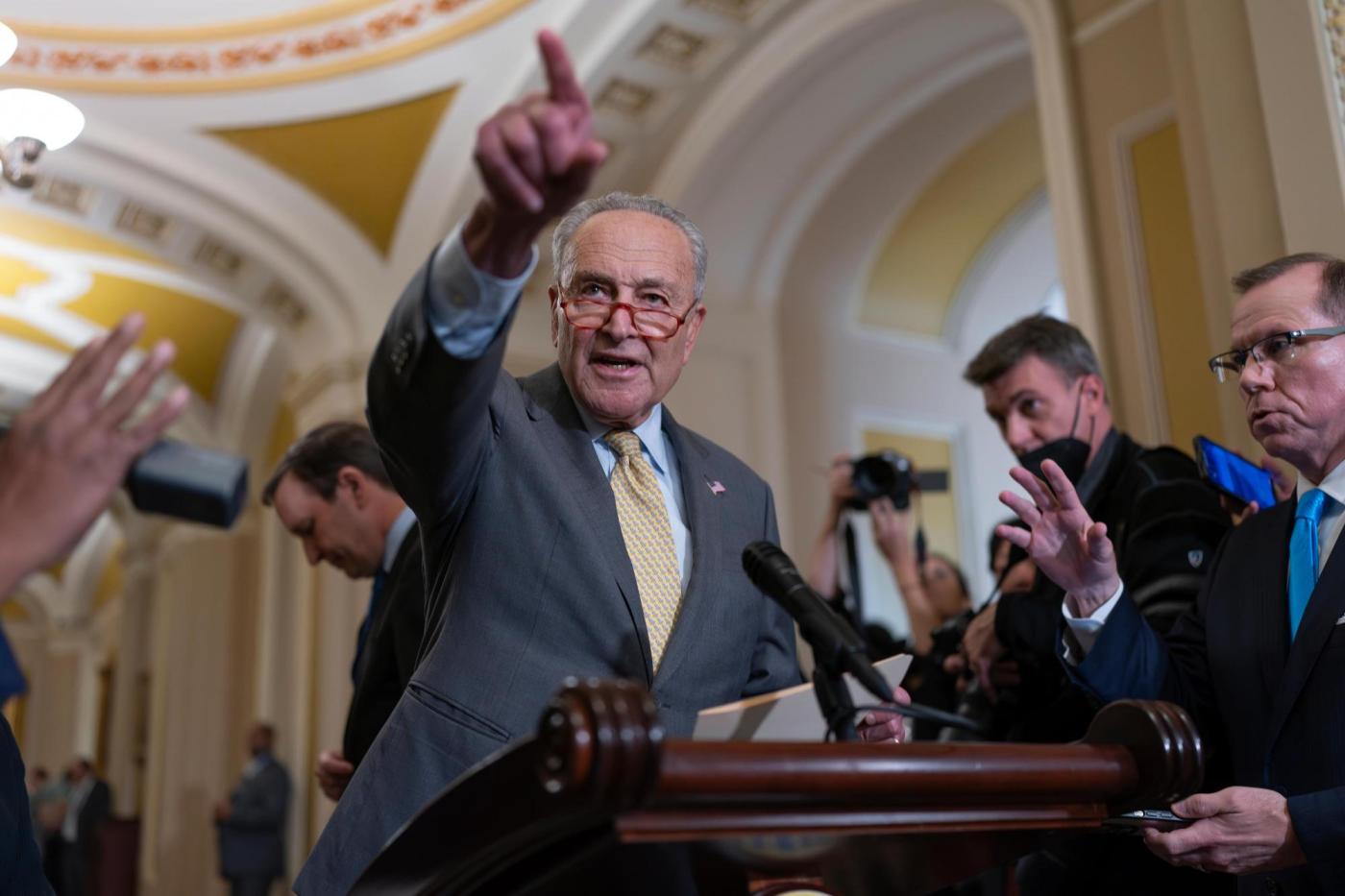
Chris Churchill: Schumer calls out antisemitism on his own side
It is depressingly easy to find examples of politicians acting like, well, politicians. You know — pandering, getting fuzzy with the truth or doing what’s politically easy instead of what’s right.
So it is worth noting when a politician speaks from the heart with illuminating clarity. That’s what Senate Majority Leader Chuck Schumer did last week in a remarkable speech calling out the dramatic rise in antisemitism since the Oct. 7 terrorist attack on Israel.
Schumer’s speech, written by the Democrat over the Thanksgiving holiday, was partly a history lesson and partly an explanation of how Jewish Americans see the world. He said he felt compelled to speak out because he’s the highest-ranking elected Jewish official in American history, a platform, he said, that comes with duty.
“I have noticed a significant disparity between how Jewish people regard the rise of antisemitism and how many of my non-Jewish friends regard it,” Schumer said during the speech delivered on the Senate floor. “To us, the Jewish people, the rise of antisemitism is a crisis — a five-alarm fire that must be extinguished.”
The cause for Schumer’s concern is well documented. Ample are the examples of prominent Americans, particularly on college campuses, either celebrating the Hamas attack or blaming Israel for it. Protesters chant “from the river to the sea” and other antisemitic slogans espoused by Hamas. According to New York City police, antisemitic violence is up by more than 200 percent.
“After Oct. 7, Jewish Americans are feeling singled out, targeted and isolated,” Schumer said. “In many ways, we feel alone.”
Schumer didn’t use the word betrayed but he could have. He noted, for example, that Jews stood with other oppressed groups during their times of distress and trouble. But now, many of the people whom liberal Jews felt were their, in Schumer’s words, “ideological fellow travelers” have turned against them.
Somehow, a Jewish people whose history has been defined by oppression are now regarded as oppressors. In Schumer’s opinion, that’s partly due to historical ignorance, particularly about the history of Israel.
He noted, for example, that many who protest against Israel highlight the displacement of 700,000 Palestinians during the 1948 Arab-Israeli War but never mention the 600,000 Mizrahi Jews in Arab nations who were also displaced, often violently. Also rarely considered is the Arab world’s repeated rejection of two-state solutions that might have brought lasting peace.
“Forgetting or even deliberately ignoring this vital context is dangerous,” Schumer said, after stressing that not all criticism of Israel is necessarily antisemitic. “(But) what may begin as legitimate criticism of Israeli policy, or even a valid debate over other religious, economic, and political issues, can sometimes cross into something darker, into attacking Jewish people simply for being Jewish.”
Schumer, 73, emotionally invoked his family history, mentioning that invading Nazis told his great-grandmother to gather her children, grandchildren and great-grandchildren on the porch of her home. Then, with other Jews in the town forced to watch, the family, infants included, was machine-gunned down.
The parallels to the October Hamas attacks are obvious. It’s the same hatred, the same determination to exterminate Jews from the Earth just because they are Jews, the same abhorrent belief that Jews are less than fully human. It’s the latest example of an oppression that stretches back thousands of years.
Related Articles
Thomas Friedman: This is the 9/11 lesson Israel needs to learn
Paul Krugman: Donald Trump still wants to kill Obamacare? Why?
Mark Gongloff: Do 70,000 people really need to be at a climate confab?
Page Fortna: In Gaza conflict, words like ‘terrorism’ and ‘genocide’ are potent weapons. Definitions matter
Rosalie Metro: Palestinian and Israeli children are endangered by ‘us vs. them’ narratives
“Can you understand why Jewish people feel isolated when we hear some praise Hamas and chant its vicious slogan?” Schumer asked. “Can you blame us for feeling vulnerable only 80 years after Hitler wiped out half of the Jewish population across the world while many countries turned their back?”
Most polls show strong American support for Israel, so you might argue that Schumer was essentially speaking to the choir. And where’s the courage in that? But liberal Democrats view the war differently than most Americans, according to polls, and that’s what makes Schumer’s speech remarkable. He was calling out his side, a step politicians rarely take.
But Schumer noted that antisemitism can metastasize, seemingly from nowhere, when allowed to fester. Consider that Germany in the early 1900s was considered one of the safest places in Europe for Jews. But that rapidly changed as the Nazis softened the ground with some of the same antisemitic conspiracy theories circulating with renewed power today, even in an America whose tolerance is epitomized by Schumer’s success.
“Many Jewish Americans fear what the future may bring, based on the repeated lessons of history,” Schumer said, later asking a question: “Are we a nation that can defy the regular course of human history, where the Jewish people have been ostracized, expelled and massacred over and over again?”
Not long ago, it would have seemed obvious that the answer was yes. But the antisemitism of recent months has rendered that opinion naive, which is why Schumer needed to speak. Will we listen?
Chris Churchill writes for the San Francisco Chronicle.

